Strictly Personal
Tinubu, his ministers and the governors, By Rotimi Fasan
Published
1 year agoon
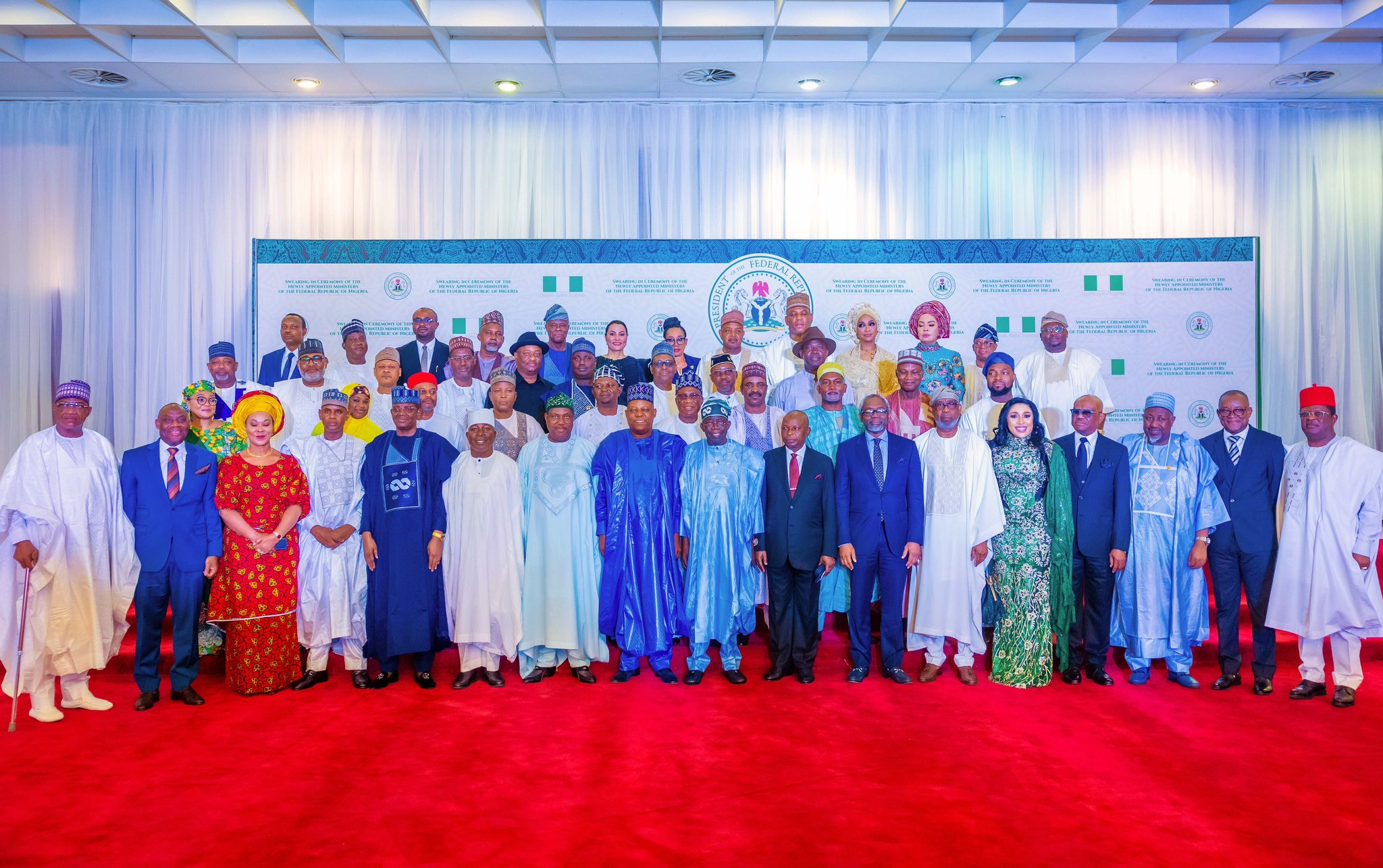
President Bola Tinubu on Monday 21st August swore into office 45 ministers after an eleventh-hour reassignment of portfolios to four of them. Gboyega Oyetola of the Ministry of Transport, Abubakar Momoh of the Ministry of Youth and Bunmi Tunji-Ojo of the Ministry of Marine and Blue Economy were respectively reassigned to the Ministry of Marine and Blue Economy, Ministry of Niger Delta Development and Ministry of Interior. Two other ministers of State in the oil and gas sector were moved to the newly-named Federal Ministry of Petroleum Resources.
Senator Heineken Lokpobiri is now Minister of State (Oil), Petroleum Resources while Ekperipe Ekpo is Minister of State (Gas), Petroleum Resources. The Federal Ministry of Environment and Ecological Management is now to be called the Federal Ministry of Environment as a result of the latest changes. With this, the president is left with only three ministries to fill. The nominees for the ministries could not scale Senate clearance as a result of adverse security reports on them. One of these three is a former governor of Kaduna State, Nasir el-Rufai, who has allegedly withdrawn his nomination and opted to pursue doctoral studies in the Netherlands.
After about two and half months without ministers, President Tinubu now has a cabinet that is almost ready to “hit the ground running”, to use an expression that has been much-abused recently. The Tinubu-led administration had come under severe criticism and mocking jibes as a result of the delay in constituting a cabinet. This, many Nigerians thought, undermined claims that the president was ready for governance. The fact that he also had to wait for more than a week after naming the ministers-designate without portfolios attached to their names was also another matter of criticism.
These apparent delays in the machinery of governance, compounded as they were by the annoying silence in the implementation of policies that were meant to ameliorate the harsh effect of the removal of oil subsidy, increased worries in some quarters that the new administration might have run out of steam so early in the day. It gave impetus to the criticisms from concerned Nigerians, including many in the opposition who would not let any opportunity slip off before attacking the president, to further call him out and label him a warmonger to deflect attention from his failing policies at home with a war with Niger.
It would not matter to these critics that President Tinubu as Chair of the Economic Community of West African States, ECOWAS, that is spearheading the opposition to the Nigerien junta was only executing his remit in light of his position in the body. The inauguration of a cabinet does not mean that the administration is out of the woods yet. There is still a lot to do beyond ministerial appointments that have suffered reversals in the designation of portfolios.
The Tinubu administration has not been shy about reversing itself on policies that have not gone down well with Nigerians. While its supporters don’t see what the problem is about that, others in the opposition believe it’s a sign of a disaster foretold from when Tinubu was declared president. One should say that the government had better make these reversals even when they are not necessarily to be cheered, than to pretend that all is well and continue down the wrong road in a bid not to be criticised. For the sake of the dire times we are in at present, every error in policy-making and execution should be corrected without delay.
The last administration that was this quick to make reversals in policy was the Umaru Yar’Adua government. That administration almost turned policy reversals (not necessarily those it made itself) into a policy in its own right, upending some of the major policies of the Olusegun Obasanjo administration and earning in its wake the ire of the retired General that piggy-backed Yar’Adua into Aso Villa in 2007. Obasanjo’s policies on deregulation/privatisation, including sale of the refineries, as well as the introduction of Value Added Tax, VAT, and monetisation of assets were reversed in short order by President Yar’Adua.
He faulted the election (mostly managed and supervised by President Obasanjo) that brought him into office and set up the Muhammed Uwais Commission. By the time, he started going after the likes of Nuhu Ribadu and Nasir el-Rufai, star boys of the Obasanjo years in power, it was as if Yar’Adua had chosen to be Obasanjo’s nemesis. Death denied Nigerians the opportunity to take full measure of the consequences of Yar’Adua’s policy somersaults. But well before his death or, in fact, years after his death his failure/refusal to see through some of the reforms proposed by the Obasanjo government have come to haunt us all and is partly the reason why we are where we are today with the Tinubu administration that now hangs the success of its deregulation of the oil sector and the removal of subsidy on the repairs of the refineries Yar’Adua didn’t sell in 2007.
Let’s also not forget that for eight years there was a President Muhammadu Buhari that was stone-deaf to cries by Nigerians to change many of the wrong-headed policies of his administration that should never have been proposed much less imposed on Nigerians. Buhari held on to those policies much in the same way he refused to change his non-performing appointees. If Tinubu must change policies and make changes that are for the good of the people, by all means, let him do that. What he cannot afford to do is not to do anything or to insist on his way being the only way just to be seen as competent.
Just as there’s no room to want to start learning on the job. There is too much at stake and he must be seen to be leading from the front. The failure or success of his ministers will be on him. He must demand excellence and good results from them as he promised in his speech during the swearing-in ceremony. As Nigerians, we must also not forget to hold the state governors to account. Many of them are not stirred to work and are hiding under the shadow of Abuja and the fixation on President Tinubu to loaf away.
Abuja alone cannot and will not succeed if Nigerians choose to ignore the shenanigans of the governors and the local government chairpersons. They have the closest connection to the people and they must be made to deliver on their mandates too. It is only where this is done, where all “hands are on deck” that we can have the full benefit of the government at the centre, including the president and his ministers.
You may like
-


Nigerian economy to grow in leaps and bounds in 2025, VP Shettima predicts
-
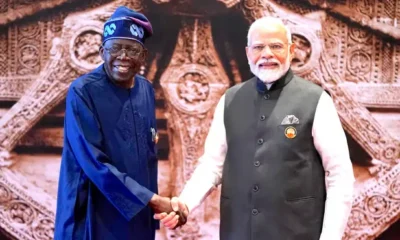

Nigeria, India to strengthen counterterrorism, maritime security cooperation
-
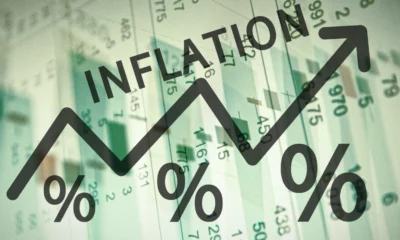

Food prices drive second straight monthly hike in Nigeria’s inflation
-


MTN financial report reveals drop in group service revenue
-
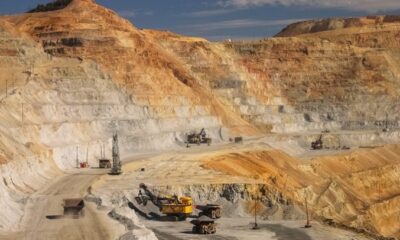

Nigeria’s $700bn mining potential attracts investors worldwide
-
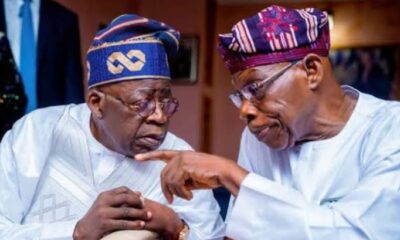

Nigeria has become a ‘failing state’ under Tinubu— Ex-President Obasanjo
Strictly Personal
African Union must ensure Sudan civilians are protected, By Joyce Banda
Published
3 weeks agoon
October 25, 2024
The war in Sudan presents the world – and Africa – with a test. This far, we have scored miserably. The international community has failed the people of Sudan. Collectively, we have chosen to systematically ignore and sacrifice the Sudanese people’s suffering in preference of our interests.
For 18 months, the Rapid Support Forces (RSF) and the Sudanese Armed Forces (SAF) have fought a pitiless conflict that has killed thousands, displaced millions, and triggered the world’s largest hunger crisis.
Crimes against humanity and war crimes have been committed by both parties to the conflict. Sexual and gender-based violence are at epidemic levels. The RSF has perpetrated a wave of ethnically motivated violence in Darfur. Starvation has been used as a weapon of war: The SAF has carried out airstrikes that deliberately target civilians and civilian infrastructure.
The plight of children is of deep concern to me. They have been killed, maimed, and forced to serve as soldiers. More than 14 million have been displaced, the world’s largest displacement of children. Millions more haven’t gone to school since the fighting broke out. Girls are at the highest risk of child marriage and gender-based violence. We are looking at a child protection crisis of frightful proportions.
In many of my international engagements, the women of Sudan have raised their concerns about the world’s non-commitment to bring about peace in Sudan.
I write with a simple message. We cannot delay any longer. The suffering cannot be allowed to continue or to become a secondary concern to the frustrating search for a political solution between the belligerents. The international community must come together and adopt urgent measures to protect Sudanese civilians.
Last month, the UN’s Independent International Fact-Finding Mission for Sudan released a report that described a horrific range of crimes committed by the RSF and SAF. The report makes for chilling reading. The UN investigators concluded that the gravity of its findings required a concerted plan to safeguard the lives of Sudanese people in the line of fire.
“Given the failure of the warring parties to spare civilians, an independent and impartial force with a mandate to safeguard civilians must be deployed without delay,” said Mohamed Chande Othman, chair of the Fact-Finding Mission and former Chief Justice of Tanzania.
We must respond to this call with urgency.
A special responsibility resides with the African Union, in particular the AU Commission, which received a request on June 21 from the AU Peace and Security Council (PSC) “to investigate and make recommendations to the PSC on practical measures to be undertaken for the protection of civilians.”
So far, we have heard nothing.
The time is now for the AU to act boldly and swiftly, even in the absence of a ceasefire, to advance robust civilian protection measures.
A physical protective presence, even one with a limited mandate, must be proposed, in line with the recommendation of the UN Fact-Finding Mission. The AU should press the parties to the conflict, particularly the Sudanese government, to invite the protective mission to enter Sudan to do its work free from interference.
The AU can recommend that the protection mission adopt targeted strategies operations, demarcated safe zones, and humanitarian corridors – to protect civilians and ensure safe, unhindered, and adequate access to humanitarian aid.
The protection mission mandate can include data gathering, monitoring, and early warning systems. It can play a role in ending the telecom blackout that has been a troubling feature of the war. The mission can support community-led efforts for self-protection, working closely with Sudan’s inspiring mutual-aid network of Emergency Response Rooms. It can engage and support localised peace efforts, contributing to community-level ceasefire and peacebuilding work.
I do not pretend that establishing a protection mission in Sudan will be easy. But the scale of Sudan’s crisis, the intransigence of the warring parties, and the clear and consistent demands from Sudanese civilians and civil society demand that we take action.
Many will be dismissive. It is true that numerous bureaucratic, institutional, and political obstacles stand in our way. But we must not be deterred.
Will we stand by as Sudan suffers mass atrocities, disease, famine, rape, mass displacement, and societal disintegration? Will we watch as the crisis in Africa’s third largest country spills outside of its borders and sets back the entire region?
Africa and the world have been given a test. I pray that we pass it.
Dr Joyce Banda is a former president of the Republic of Malawi.
Strictly Personal
Economic policies must be local, By Lekan Sote
Published
4 weeks agoon
October 24, 2024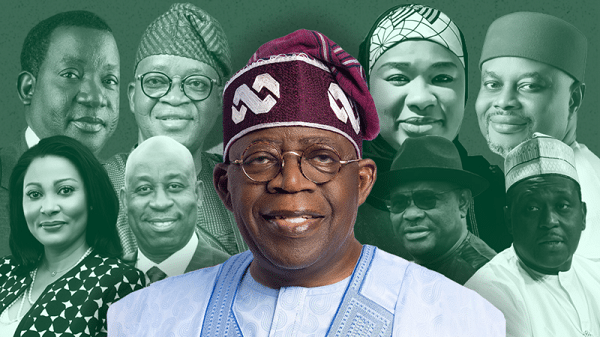
With 32.70 per cent headline inflation, 40.20 per cent food inflation, and bread inflation of 45 per cent, all caused by the removal of subsidies from petrol and electricity, and the government’s policy of allowing market forces to determine the value of the Naira, Nigerians are reeling under high cost of living.
The observation by Obi Alfred Achebe of Onitsha, that “The wellbeing of the people has declined more steeply in the last months,” leads to doubts about the “Renewed Hope” slogan of President Bola Tinubu’s government that is perceived as extravagant, whilst asking Nigerians to be patient and wait for its unfolding economic policies to mature.
It doesn’t look as if it will abate soon, Adebayo Adelabu, Minister of Power, who seems ready to hike electricity tariffs again, recently argued that the N225 per kilowatt hour of electricity that Discos charge Band A premium customers is lower than the N750 and N950 respective costs of running privately-owned petrol or diesel generators.
While noting that 129 million, or 56 per cent of Nigerians are trapped below poverty line, the World Bank revealed that real per capita Gross Domestic Product, which disregards the service industry component, is yet to recover from the pre-2016 economic depression under the government of Muhammadu Buhari.
This has led many to begin to doubt the government’s World Bank and International Monetary Fund-inspired neo-liberal economic policies that seem to have further impoverished poor Nigerians, practically eliminated the middle class, and is making the rich also cry.
Yet the World Bank, which is not letting up, recently pontificated that “previous domestic policy missteps (based mainly on its own advice) are compounding the shocks of rising inflation (that is) eroding the purchasing power of the people… and this policy is pushing many (citizens) into poverty.”
It zeroes in by asking Nigeria to stay the gruelling course, which Ibukun Omole thinks “is nothing more than a manifesto for exploitation… a blatant attempt to continue the cycle of exploitation… a tool of imperialism, promoting the same policies that have kept Nigeria under the thumb of… neocolonial agenda for decades.”
When Indermilt Gill, Senior Vice President of the World Bank, told the 30th Summit of Nigeria’s Economic Summit Group, in Abuja, Federal Capital Territory, that Nigerians may have to endure the harrowing economic conditions for another 10 to 15 years, attendees murmured but didn’t walk out on him because of Nigerian’s tradition of politeness to guests.
Governor Bala Muhammed of Bauchi State, who agrees with the World Bank that “purchasing power has dwindled,” also thinks that “these (World Bank-inspired) policies, usually handed down by arm-twisting compulsions, are not working.”
What seems to be trending now is the suggestion that because these neo-liberal policies do not seem to be helping the economy and the citizens of Nigeria, at least in the short term, it would be better to think up homegrown solutions to Nigeria’s economic problems.
Late Speaker of America’s House of Representatives, Tip O’Neill, is quoted to have quipped that, at the end of the day, “All politics is local.” He may have come to that conclusion after observing that it takes the locals in a community to know what is best for them.
This aphorism must apply to economics, a field of study that is derived from sociology, which is the study of the way of life of a people. Proof of this is in “The Wealth of Nations,” written by Adam Smith, who is regarded as the first scholar of economics.
In his Introduction to the Penguin Classics edition of “The Wealth of Nations,” Andrew Skinner observes: “Adam Smith was undoubtedly the remarkable product of a remarkable age and one whose writing clearly reflects the intellectual, social and economic conditions of the period.”
To drive the point home that Smith’s book was written for his people and his time, Skinner reiterated that “the general ‘philosophy,’ which it contained was so thoroughly in accord with the aspirations and circumstances of his age.”
In a Freudian slip of the Darwinist realities of the Industrial Revolution that birthed individualism, capitalism, and global trade, Smith averred that “How selfish soever man may be supposed, there are evidently some principle in his nature which interest him in the fortune of others, and render their happiness necessary to him, though he derives nothing from it, except the pleasures of seeing it.”
And, he let it slip that capitalism is for the advantage of Europe when he confessed that “Europe, by not leaving things at perfect liberty (the so-called Invisible Hand), occasions… inequities,” by “restraining the competition in some trades to a smaller number… increasing it in others beyond what it naturally would be… and… free circulation of labour (or expertise) and stocks (goods) both from employment to employment and from place to place!”
Policymakers, who think Bretton Woods institutions will advise policies to replicate the success of the Euro-American economy in Nigeria must be daydreaming. After advising elimination of subsidy, as global best practices that reflect market forces, they failed to suggest that Nigeria’s N70,000 monthly minimum wage, neither reflects the realities of the global marketplace, nor Section 16(2,d) of Nigeria’s Constitution, which suggests a “reasonable national minimum living wage… for all citizens.”
After Alex Sienart, World Bank’s lead economist in Nigeria, pointed out that the wage increase will directly affect the lives of only 4.1 per cent of Nigerians, he suggested that Nigeria needed more productive jobs to reduce poverty. But he neither explained “productive jobs,” nor suggested how to create them.
In admitting past wrong economic policies that the World Bank recommended for Nigeria, its former President, Jim Yong Kim, confessed, “I think the World Bank has to take responsibility for having emphasized hard infrastructure –roads, rails, energy– for a long time…
“There is still the bias that says we will invest in hard infrastructure, and then we grow rich, (and) we will have enough money to invest in health and education. (But) we are now saying that’s the wrong approach, that you’ve got to start investing in your people.”
Kim is a Korean-American physician, health expert, and anthropologist, whose Harvard University and Brown University Ivy League background shapes his decidedly “Pax American” worldview of America’s dominance of the world economy.
Despite his do-gooder posturing, his diagnoses and prescriptions still did not quite address the root cause of Nigeria’s economic woes, nor provide any solutions. They were mere diversions that stopped short of the way forward.
He should have advocated for the massive accumulation of capital and investments in the local production of manufacturing machinery, industrial spare parts, and raw materials—items that are currently imported, weakening Nigeria’s trade balance.
He should have pushed for the completion of Ajaokuta Steel Mill and helped to line up investors with managerial, technical, and financial competence to salvage Nigeria’s electricity sector, whose poor run has been described by Dr. Akinwumi Adesina, President of Africa Development Bank, as “killing Nigerian industries.”
He could have assembled consultants to accelerate the conversion of Nigeria’s commuter vehicles to Compressed Natural Gas and get banks of the metropolitan economies, that hold Nigeria’s foreign reserves in their vaults, to invest their low-interest funds into Nigeria’s agriculture— so that Nigeria will no longer import foodstuffs.
Nigerians need homegrown solutions to their economic woes.
EDITOR’S PICK


Nigerian economy to grow in leaps and bounds in 2025, VP Shettima predicts
Nigeria’s Vice President, Kashim Shettima, has predicted that the country’s economy will grow in leaps and bounds in 2025 due...


Nigeria, India to strengthen counterterrorism, maritime security cooperation
During a state visit to Nigeria on Sunday, Indian Prime Minister, Narendra, Modi reached an agreement, on behalf of his...


Military advisors from Russia arrive Equatorial Guinea
Russian military advisors are in Equatorial Guinea training indigenous soldiers. Anonymous sources cited by Reuters during the week claim that...


Food prices drive second straight monthly hike in Nigeria’s inflation
According to official statistics released on Friday, Nigeria’s inflation rate increased for the second consecutive month in October, rising to...


Morocco’s Mpox test gets African CDC endorsement
A major step forward in Africa’s response to the continuing epidemic was taken Thursday when the Africa Centres for Disease...


MTN financial report reveals drop in group service revenue
Due to operational difficulties in Sudan and the depreciation of the Nigerian naira, MTN Group, Africa’s largest telecom provider, announced...


Nigeria’s $700bn mining potential attracts investors worldwide
Diplomatic sources cited in a local report have claimed that global investors are interested in Nigeria’s mining sector reforms under...
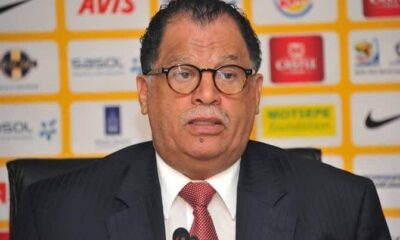

South Africa FA President Danny Jordaan detained. Here’s why
Danny Jordaan, the president of the South African Football Association (SAFA), was taken into custody on Wednesday on suspicion of...
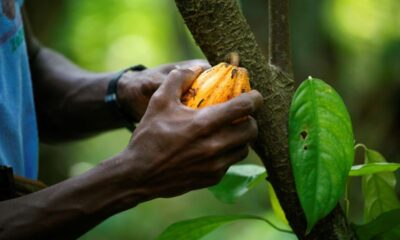

Ivory Coast to create $500 million green financing fund
Ivory Coast will establish a $500 million green financing fund to assist sustainable growth, the IMF said. Africa’s 54 countries...


Russia claims African, ex-Soviet nations want its mpox vaccine
Several African and former Soviet nations have shown interest in purchasing Russia’s smallpox and Mpox virus vaccine, testing equipment, and...
Trending
-

 VenturesNow1 day ago
VenturesNow1 day agoMTN financial report reveals drop in group service revenue
-

 VenturesNow1 day ago
VenturesNow1 day agoNigeria’s $700bn mining potential attracts investors worldwide
-

 Metro1 day ago
Metro1 day agoNigeria has become a ‘failing state’ under Tinubu— Ex-President Obasanjo
-

 Metro1 day ago
Metro1 day agoMorocco’s Mpox test gets African CDC endorsement


